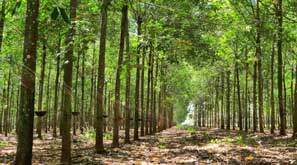Global advocacy organisation Mighty Earth has urged the European Commission (EC) to reverse its decision to drop rubber from the EU’s new anti-deforestation supply chain law. This comes after the environmental group revealed that the use of key deforestation data by the EC to justify its decision to drop rubber from the law was flawed because it may significantly underestimate the scale of embodied deforestation for rubber imports into the EU.
The European Commission’s leaked draft Regulation shows the EC dropped rubber after their assessment of eight key forest-risk commodities found rubber was responsible for the second lowest amount of embodied deforestation risk, accounting for 6,830 ha of embedded deforestation into the EU, or just 3.4% of the total share. The EC found the largest share of embodied deforestation among commodities analysed were palm oil (33.9%), soy (32.8%), wood (8.6%), cocoa (7.5%), coffee (7%) and beef (5%).
However, Mighty Earth find in a new briefing that the European EC’s use of a key embodied deforestation dataset to assess the eight commodities was incomplete and flawed in relation to rubber in particular because it only includes embodied deforestation data for imports of unprocessed natural rubber products and fails to include embodied deforestation data for huge quantities of processedrubber products into the EU, such as processed new rubber tyres, inner tubes, pharmaceutical articles, apparel and vulcanised rubber. Much of which contain large amounts of natural rubber and possibly associated deforestation risk.
Our recent analysis of Eurostat trade data found the 2020 dataset used by the EC’s cost-benefit analysis assessment only includes embodied deforestation data for possibly about a quarter of the total amount of natural rubber imports into the EU. Eurostat figures show the EU imported 5.9 million tonnes of natural rubber – both unprocessed and processed rubber – in 2019, including 1.2 million tonnes of unprocessed natural rubber, 2.1 million tonnes of processed new rubber tyres and 841,000 tonnes of processed rubber inner tubes, pharmaceutical articles, apparel, re-treaded tyres and vulcanised rubber products. According to Mighty Earth, while some of the imports above may include double counted goods, possibly millions of tonnes of processed rubber imports into the EU have not been included or analysed in the EC’s assessment of embodied deforestation risk.
“It’s a scandal that the European Commission has dropped rubber from its new anti-deforestation law by only looking at a limited portion of the import data,” said Alex Wijeratna, director of special projects at Mighty Earth. “It’s a staggering mistake that needs to be urgently rectified.”
“European tyre corporations like Michelin and Continental clearly realise this mistake but have remained silent, unlike other consumer goods companies which have come out strongly in favour of the legislation covering all tropical forest-risk commodities. The rubber industry lags behind other sectors when it comes to tackling environmental destruction, making it all the more vital that the Commission gets its data right and legislates for deforestation-free rubber into the EU,“ said Wijeratna.
Academics warn that up to 8.5 million ha of additional rubber plantations will be required to meet rising global demand by 2024. Scientists also warn of extensive deforestation, biodiversity loss and carbon emissions as global rubber demand is predicted to boom by a third by 2030 and say Africa will likely be the new deforestation frontier.

